The IGP Chronicles Part 1: Intel's G45 & Motherboard Roundup
by Anand Lal Shimpi & Gary Key on September 24, 2008 12:00 PM EST- Posted in
- Motherboards
The Test-
| Standard Test Bed - Intel Configuration | |
| Processor | Intel Core 2 Quad - Q9300 |
| RAM | Patriot PUS24G6400LLK - 4GB DDR2-800 4-4-4-12 (DDR2-800) G.Skill F2-8800CL5Q-8GBPI 4GB DDR2-1150 5-5-5-18 (DDR2-1066) Corsair CM3X2G1600ZC9DHXNV 4GB DDR3 6-6-6-18 (DDR3-1333) |
| Hard Drive | Western Digital Caviar SE16 640GB |
| System Platform Drivers | Intel - 9.0.0.1011 |
| Storage Drivers | Intel - 8.5.0.1032 |
| Video Drivers | Intel - 15.11.2.1554 |
| CPU Cooling | Intel - Retail |
| Power Supply | Corsair - HX-520W |
| Optical Drives | Sony BDU-X10S, LG GGC-H20L |
| Case | Thermaltake Bach Media Lab VB8000BNS, stock case fans |
| Motherboards | ASUS P5E-VM HDMI (Intel G35) - BIOS 0604 ASUS P5Q-EM (G45) - BIOS 0402 Gigabyte GA-EG45M-DS2H (G45) - BIOS F3F Super Micro Super-C2SEA (G45 DDR3) - BIOS R1.0a Intel DG45ID (G45) - BIOS 079 |
| Operating System | Windows Vista 32-bit Ultimate (Benchmarks), Vista 64-bit Memory Compatibility Testing |
| . | |
Our test bed today features the Q9300 quad-core processor. This is a processor that we believe offers terrific performance with very good power consumption and thermals for the cost. We will have results in the next article with the E1200, E5200, E7200, and Q8200 processors to compare against several AMD processors in the same price and speed ranges. Our Patriot DDR2-800 Viper 4GB memory kit has served us well for the past few months and we highly recommend it. We chose Corsair for our XMS2 DDR3 4GB kit and the HX-520W power supply. Our favorite mid-range HD continues to be the Western Digital SE16 640GB that provides the near perfect balance of price, performance, and capacity.
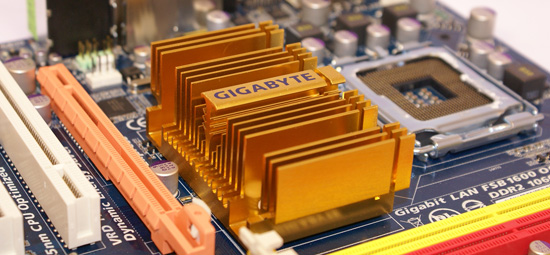
General Performance-
We ran all of our tests with a Core 2 Quad Q9300, however the Mini ITX G45 board from Intel doesn't support quad-core processors so we included E5200 scores from Intel's own micro-ATX and mini-ITX boards for comparison.
You'll notice that these boards all perform about the same, which is to be expected these days with same-chipset performance. In Part 2 of this series we'll compare the equivalent AMD offerings along with several different processors, but if you're looking for an Intel platform you'll find that G45 boards are on equal performance footing.
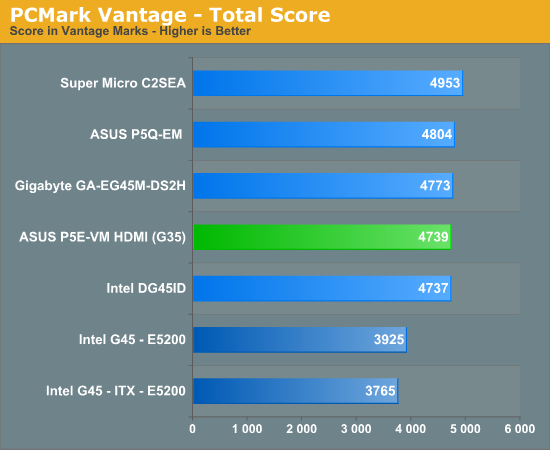
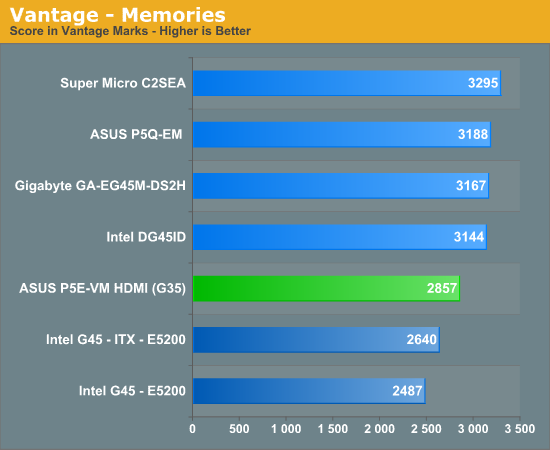
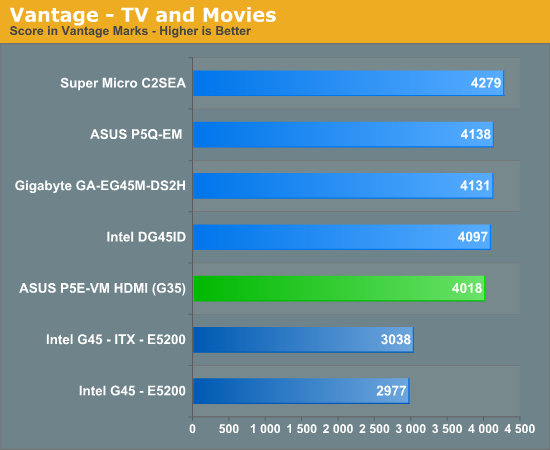
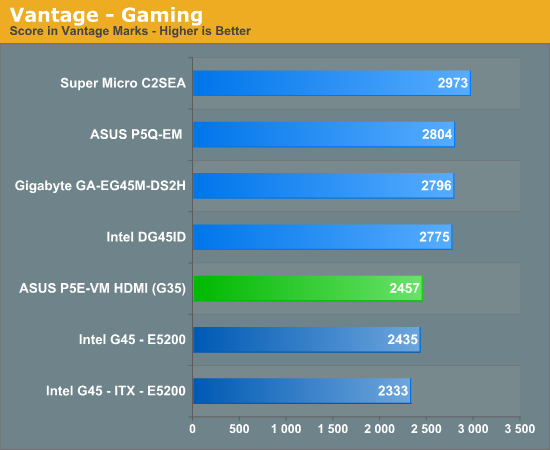
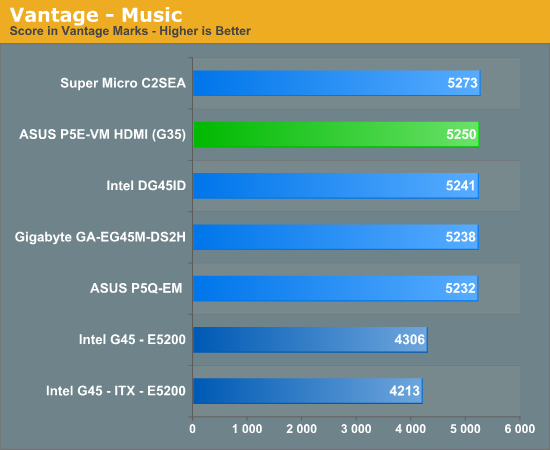
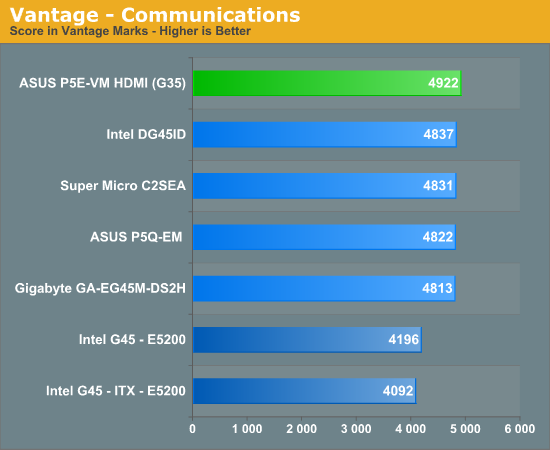
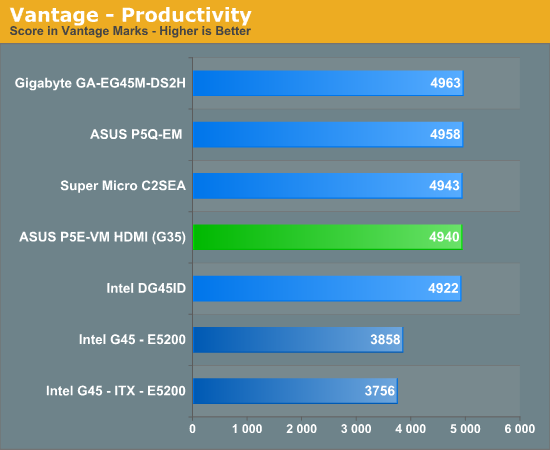
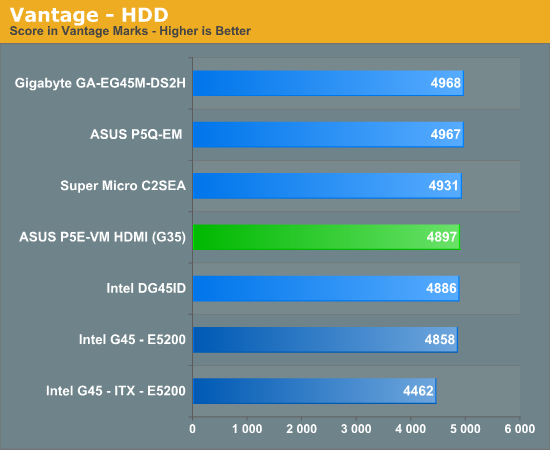










53 Comments
View All Comments
sprockkets - Wednesday, September 24, 2008 - link
Except the fact that you needed a firmware update on the home theater receiver is just bulls****.Thanks DRM!
I can't wait till VLC gets native blue ray support! At least we have Sly-Soft!
DoucheVader - Friday, September 26, 2008 - link
Hey if it wasn't for a vast majority of people copying stuff, we wouldn't have DRM. I am sick of the complaints. We as consumers created this problem.Most things that have DRM are to protect someone's bread and butter. How would you like it if every time you got paid there was some money missing?
- Saturday, September 27, 2008 - link
Your point might be valid if DRM worked, but can you point out a single mainstream home theater medium on which the DRM means anything to the pirates?DRMed CDs? Ha. Those just pissed off consumers when they inevitable didn't play in some players and/or contained bad software. Often defeated with the frickin shift key.
DVD? People have tattoos of the DeCSS source code it's that damn short. Amusingly the longest lasting DRM scheme, with 2.5 years between the first DVD movie release and the release of DeCSS.
HD-DVD? 253 days, not even a full year after the format first shipped its AACS protection system was cracked. Under three weeks later the first copies start showing up on private trackers.
Blu-Ray (AACS)? The same AACS crack applied to it, and about two weeks after the first HD-DVD copies showed up Blu-Ray was right behind it. Launch to first pirated movie: 225 days.
Blu-Ray (BD+)? Slightly harder than AACS apparently, but titles did not ship with it until October 2007 so the cracking community got off to a late start. AnyDVD HD supported decrypting all BD+ titles roughly 5 months after the first titles shipped and copies again showed up soon after.
I'm less familiar with DVD-Audio and SACD, but my understanding is that there hasn't been a direct "crack" of their respective encryption but instead PC-based players and/or sound drivers are modified to just write the decoded bitstream to the hard drive. This works quite well for audio, as in most cases the compression (if any) applied on the disc is not wanted and the uncompressed PCM stream is exactly what the user desires. For obvious reasons that is not feasible with video.
Once these protections are broken, they do nothing to reduce piracy and only remain to prevent fair-use backups by technologically illiterate users and/or to annoy consumers with crap like these HDCP issues.
It doesn't even matter to the pirate crowd whether the cracks are public or private, as long as someone can do it that means the files will get out, and once they're out they're out.